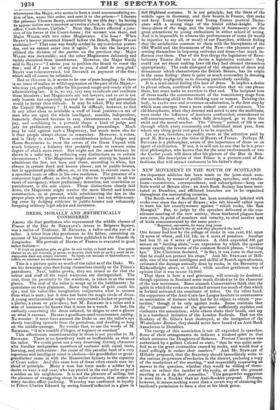DRESS, MORALLY AND /ESTHETICALLY CONSIDERED.
Ammo the four gentlemen who represented the middle classes of France at the Due de BORDEALTX'S levees in Belgrave Square, was a native of Toulouse, M. RICHARD, a tailor and the son of a tailor. A letter from this gentleman to his father, containing an account of his presentation, has been published in the Gazette du Languedoc. His portrait of HENRI of France is executed in good tailor fashion-
11 &sit en pantalon gels, en gilet de sole violet, et habit noir. Tine petite &tine en or, qui retenait, je pense, sa montre, emit tout ce qu'il y strait its re- m/arguable dans son simple costume. Sa figure eat amicale et bienveillante, et reflete en souriant les sentimens de son creur."
This is a picture quite as much of the tailor as of the Duke. We see his downcast eyes first fixing themselves timidly on the Prince's pantaloons. Next, bolder grown, they are raised so far that the colour and stuff of the royal waistcoat are distinguished. The coat, from its proximity to the waistcoat, is taken in at the same glance. The soul of the tailor is wrapt up in the habiliments : he speculates on their plainness. Some tiny links of gold catch his eye ; and his tailor-like imagination conjectures what is unseen from what is seen; but it does not burst the magic circle of dress. A young sentimentalist might have conjectured a locket or portrait ; a pietist, a cross or prie-dieu ; but M. RICHARD is a tailor and a man of business—he knows that it must be a watch. At last, his curiosity concerning the dress satiated, he deigns to cast a glance on what it encases. He sees a goodhumoured countenance smiling. No wonder : it must have amused the Duke to see the tailor's eye slowly travelling upwards from the pantaloon, and dwelling so long on the middle-passage. No wonder that, to use the words of M. RICHARD, "ii m'a comble d'eloges, et toujours en souriant." This affectionate connoisseurship in dress is not peculiar to M. RICHARD. There is no hereditary taste so ineffaceable as that of the tailor. We could point out a very deserving literary character who handles antiquarian questions of costume with equal taste, learning, and enthusiasm : the cause of this peculiar bent of a very ingenious and intelligent mind is obvious—his grandfather or great- grandfather came in with the Hanoverian dynasty in the capacity of Court tailor. And this same love of dress often stands men in- stead of principle. Many a man has been made a soldier by a desire to wear a red coat, who has proved in the end quite as good a soldier as his neighbours. It is not the pleasure of sailing, but the pleasure of swaggering about in sailor costume, that makes so many dandies affect yachting. Waverley was confirmed in loyalty to Prince Charles Edward by seeing himself reflected in a glass in
full Highland costume. It is not principle, but the dress of the middle ages in Germany, and their beards in France, that make and keep Young Germany and Young France poetical Demo- crate with a strong tinge of the feudal robber-knight. The fancy-dress of the stage and the insignia a freemasonry are the great attractions to young enthusiasts in either school of acting. And it is impossible to witness the performances of some (it would be injustice to say all, or most) of our Puseyites, without feeling that the satisfaction common to them with the hierophante of the Old World and the freemasons of the New—the pleasure of pre- senting themselves in imposing attitudes and dress—has much in- fluence over them. One of the first things the legislators of Revo- lutionary France did was to devise a legislative costume: they could not set about making laws till they had dressed themselves appropriately. The rude disregard of the elegancies of dress and demeanour which characterizes the British Senate, has its origin in the same feeling : there is quite as much coxcombry in dressing particularly negligently as in dressing particularly carefully.
It is a semi-moral feeling this love of dress. It implies a desire to please others, combined with a conviction that we can please them, but must make an exertion to that end. The incipient love of dress marks the commencement of the transitionary stage from the unreflecting child to the thinking man or woman. Painting the body, to excite awe and reverence or admiration, is the first step by which man emerges from a mere animal state of existence. The old hierophants, when they dressed and acted to awe the multitude, were under the influence of instincts confounded, unawakened to self-consciousness, which, when fully developed, go to form the artist and the moral teacher. The " dressy " period of life is one through which every community and individual must pass, from whom any thing great and good is to be expected. Let us not, therefore, too rashly sneer at the attention paid by good M. RICHARD to the dress of Herm of France. Perhaps M. RICHARD is a philosopher, aware of the importance of dress as an agent of civilization. If not, it is still ten to one that he is a prac- tical philosopher, who knows that for the next twelvemonth or two the Carlist youth will dress after his picture of the Due de B011 DEAUX. His description of that Prince is a pattern-card of the fashions, that will attract customers to his father's shop.






















 Previous page
Previous page